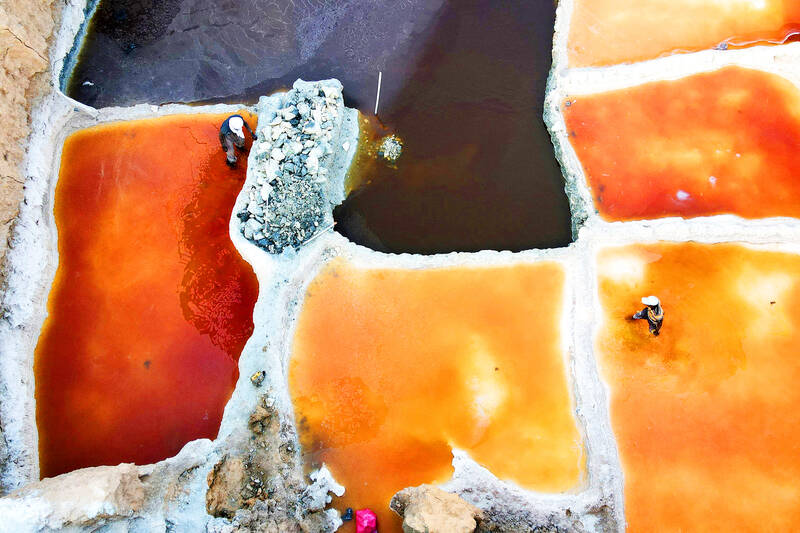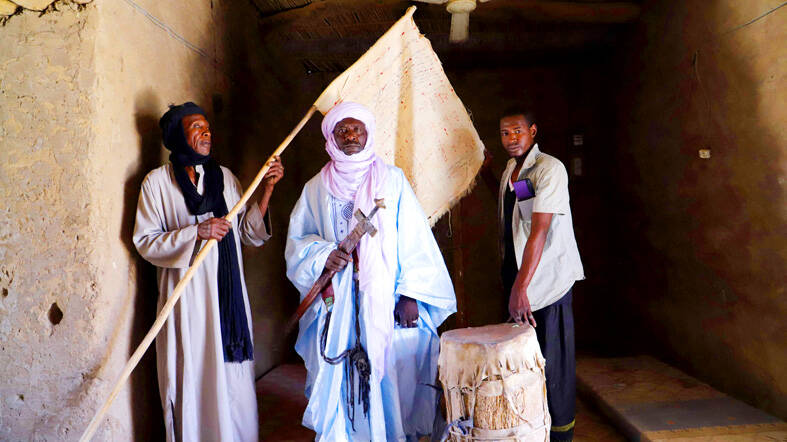At the edge of an oasis almost engulfed by the dunes, where the rare caravan still passes, is a desert landscape punctured by holes.
The salt pans of Kalala, near Bilma in northeastern Niger, were once an essential stop for traders with their swaying lines of camels.
Salt digging, carried on from generation to generation, was a thriving business, involving a commodity so precious that it was bought and sold across the Sahara and beyond.

Photo: AFP
Today, in this isolated desert region plagued by armed gangs and smugglers, the diggers struggle to survive.
Over centuries, hundreds of pits have been dug by hand and then filled with water to leach salt from the local rock.
Standing in the black and ochre pits, Ibrahim Tagaji and a colleague were wrestling with a crowbar to harvest the bounty — a method of extraction that essentially remains unchanged over time. A blisteringly hot day, when the temperatures reached 45°C in the shade, was coming to a close.

Photo: AFP
Barefoot in brine swimming with crystals, the two men dug out salty chunks and pounded them into grains, which were then scooped out with a gourd.
They then poured the salt into molds made from date palms, forming slabs that were then ready for sale.
It is punishingly hard work, rewarded by an income that fluctuates according to whichever buyers happen to pass through town.

Photo: AFP
“When someone with money comes, you earn a lot,” Tagaji said between shovelfuls. “Otherwise, it’s a lot of work and the money’s poor.”
The local economy offers few alternatives and about half of Bilma’s population still works in the pits, local officials said.
“As soon as you drop out of school, you have to work here,” said Omar Kosso, a veteran of the industry. “Every family has its own salt pan. You are with your wife, your children, you come and work.”

Photo: AFP
The camel caravans still stop over in Bilma, where the vast majority of residents live in traditional houses with walls of salt and clay drawn from nearby quarries.
An individual called the “mai” is the traditional authority here, determining who gets which area to dig and setting the sale price.
Kiari Abari Chegou comes from a long line of chiefs, each of whom has handed down to his successor the office and its attributes: a ritual sword and a parchment leather war drum.
There is also the white flag covered with surahs, the same one displayed by his grandfather in an old black-and-white photograph from the early 1920s pinned to the wall of the family home.
As mai, Abari Chegou promotes the virtues of the locally produced salt.
“Sea salt has to be iodized to avoid deficiencies,” he said. “Our salt is 90 percent iodized, so we can eat it directly without risking getting sick.”
Unfortunately for Bilma, the world outside has changed.
“In the past, the caravans came — the Daza, the Hausa, the Tuareg,” he said, reeling off some of ethnic groups in the region. “Now it’s not like before.”
For example, the Tuareg traders gradually gave up their nomadic way of life to settle, farming the fertile foothills of the nearby Air Mountains in the north.
“You make more money like that than tiring yourself out spending 10 days traveling to get to Bilma, then 10 days back,” Abari Chegou said.
It made more sense to buy a slab of salt for 2,000 CFA francs (US$3.28) in Agadez, the regional capital 550km away, than to travel all the way to Bilma to bargain for it at one-third of the price, he said.
The desert journey is as dangerous as it is tough.
The Kaouar oasis borders Chad and Libya, a country ravaged by a civil war since 2011, and traffickers and other criminals take advantage of the region’s porous borders.
That means that people travel in the region armed and, where possible, in convoys under military escort to guard against attacks.
“The bandits stop our trucks, they take our phones and money and then they let us through,” said a driver who gave his name as Ahmed and was about to set off with sacks of salt.
Salt worker Omar Kosso said that customers were hard-bargaining merchants, passing traders or traffickers.
“We don’t have good customers,” he said.
All of that means that offers are difficult to refuse for the people in this poor region.
The EU did pay for several trucks, in an bid to open up the salt-producing municipalities.
However, the fleet of vehicles succumbed to the heat, the rugged roads and squabbles between members of the local cooperative.
Abari Chegou said that he dreamt of a “well-knit” cooperative that could buy vehicles and have a place to store production to help buttress prices.
In the meantime, he waited for the lonely caravans that passed between the dunes.

Intel Corp chief executive officer Lip-Bu Tan (陳立武) is expected to meet with Taiwanese suppliers next month in conjunction with the opening of the Computex Taipei trade show, supply chain sources said on Monday. The visit, the first for Tan to Taiwan since assuming his new post last month, would be aimed at enhancing Intel’s ties with suppliers in Taiwan as he attempts to help turn around the struggling US chipmaker, the sources said. Tan is to hold a banquet to celebrate Intel’s 40-year presence in Taiwan before Computex opens on May 20 and invite dozens of Taiwanese suppliers to exchange views

Application-specific integrated circuit designer Faraday Technology Corp (智原) yesterday said that although revenue this quarter would decline 30 percent from last quarter, it retained its full-year forecast of revenue growth of 100 percent. The company attributed the quarterly drop to a slowdown in customers’ production of chips using Faraday’s advanced packaging technology. The company is still confident about its revenue growth this year, given its strong “design-win” — or the projects it won to help customers design their chips, Faraday president Steve Wang (王國雍) told an online earnings conference. “The design-win this year is better than we expected. We believe we will win

Chizuko Kimura has become the first female sushi chef in the world to win a Michelin star, fulfilling a promise she made to her dying husband to continue his legacy. The 54-year-old Japanese chef regained the Michelin star her late husband, Shunei Kimura, won three years ago for their Sushi Shunei restaurant in Paris. For Shunei Kimura, the star was a dream come true. However, the joy was short-lived. He died from cancer just three months later in June 2022. He was 65. The following year, the restaurant in the heart of Montmartre lost its star rating. Chizuko Kimura insisted that the new star is still down

While China’s leaders use their economic and political might to fight US President Donald Trump’s trade war “to the end,” its army of social media soldiers are embarking on a more humorous campaign online. Trump’s tariff blitz has seen Washington and Beijing impose eye-watering duties on imports from the other, fanning a standoff between the economic superpowers that has sparked global recession fears and sent markets into a tailspin. Trump says his policy is a response to years of being “ripped off” by other countries and aims to bring manufacturing to the US, forcing companies to employ US workers. However, China’s online warriors